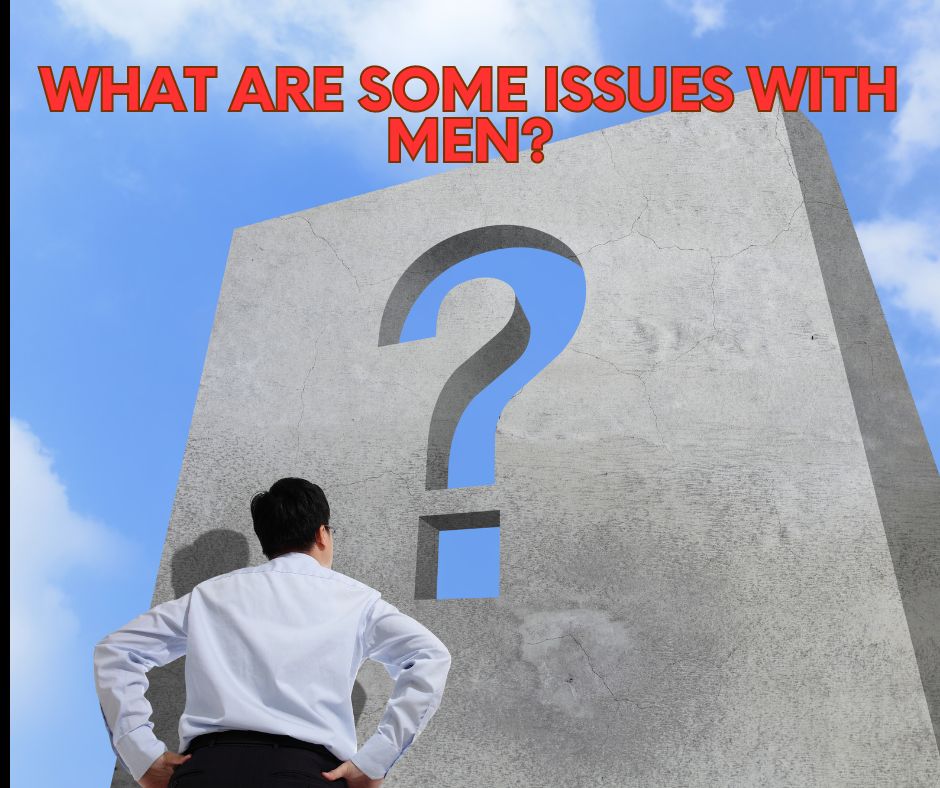

Men face a myriad of unique issues and challenges that often go unnoticed or unacknowledged. From societal expectations and stereotypes to mental health struggles and insufficient support systems, there are numerous obstacles that can impact men’s well-being.
This article aims to shed light on some of these issues, providing insight and understanding into the experiences of men that are often overshadowed.
By exploring these topics, we can foster a compassionate and inclusive society that addresses the needs and concerns of all genders.
Mental Health
High Suicide Rates
Mental health is a crucial aspect of overall well-being, and unfortunately, one that often goes overlooked, especially when it comes to men.
One significant issue that men face is high suicide rates. While it is important to note that mental health challenges affect individuals of all genders, statistics consistently show that men are at a higher risk of ending their own lives.
This alarming trend can be attributed to a variety of factors, including societal expectations, cultural norms, and limited access to mental health services.
Underreporting and Stigma
Another challenge that men face regarding mental health is underreporting and the stigma associated with seeking help.
There is a pervasive notion that men should be strong, and independent, and avoid showing vulnerability.
Unfortunately, this societal pressure often discourages men from reaching out for support when they are struggling.
The fear of being perceived as weak or less masculine can prevent men from discussing their mental health concerns, exacerbating their internal struggles.
Lack of Access to Mental Health Services
Limited access to mental health services is a significant issue that affects both men and women, but men often face additional barriers.
While strides have been made in recent years to increase awareness and improve access to mental health resources, men may still encounter challenges in finding appropriate care.
Factors such as cost, availability, and the stigma associated with seeking help can prevent men from seeking the support they need. It is crucial to prioritize accessible and affordable mental health services to address this disparity.
Toxic Masculinity
Societal Pressure to Behave a Certain Way
Toxic masculinity, a term used to describe harmful stereotypes and expectations imposed on men, can have detrimental effects on their mental health and overall well-being.
Society often emphasizes traditional masculine traits such as strength, dominance, and emotional suppression, leaving little room for expressing vulnerability or seeking help.
Men may feel compelled to conform to these societal expectations, which can lead to internal conflicts, emotional distress, and a persistent sense of being trapped in a narrow definition of masculinity.
Emotional Suppression
Closely linked to the pressure to behave a certain way, emotional suppression is a significant issue faced by many men. Society often discourages men from openly expressing their emotions, promoting the misconception that doing so is a sign of weakness.
This creates an environment where men may struggle to acknowledge and address their emotional needs, leading to increased stress, anxiety, and a lack of healthy coping mechanisms.
Aggression and Violence
Toxic masculinity can also contribute to aggression and violence. The idea that men should be dominant and aggressive in order to assert their masculinity can perpetuate harmful behaviors.
This pressure to conform to these expectations can result in men resorting to violence as a means of asserting control and power.
This not only harms their relationships with others but also perpetuates a cycle of toxic behavior and further perpetuates harmful societal norms.
Gender Inequality


Pay Gap
Despite significant progress in the fight for gender equality, there are still concerning disparities when it comes to workplace dynamics. The gender pay gap remains a prominent issue, with women earning less than men for the same work.
The persistent inequalities in pay can exacerbate financial stress and limit opportunities for women to achieve their full potential.
Moreover, it reinforces outdated ideas of gender roles and contributes to a society that undervalues and undermines women’s contributions.
Underrepresentation in Leadership Roles
Gender inequality is not limited to financial disparities, but also extends to leadership positions. Women continue to face barriers to accessing and advancing into leadership roles across various industries.
The underrepresentation of women in positions of power not only perpetuates gender biases but also limits the diversity of perspectives and experiences that contribute to more inclusive decision-making processes.
Unbalanced Division of Household Labor
Gender inequality also manifests within the domestic sphere, particularly when it comes to the division of household labor. Despite progress in challenging traditional gender roles, women continue to shoulder a disproportionate amount of domestic responsibilities.
This unbalanced division of labor can limit women’s opportunities for career advancement and personal fulfillment, while men may miss out on the valuable experiences and relationships that result from sharing household duties equally.
Sexual Harassment and Assault


Perpetration and Victimhood
Sexual harassment and assault are issues that affect individuals of all genders, but it is important to acknowledge that men can both be victims and perpetrators. While women remain the primary victims, incidents involving male victims are often underreported due to societal stereotypes and stigma.
Additionally, men who have experienced sexual harassment or assault may face unique challenges in seeking support, as there is often a lack of understanding and resources tailored to their experiences.
Cultural Norms and Patriarchy
The prevalence of sexual harassment and assault is deeply rooted in cultural norms and patriarchal systems that perpetuate power imbalances and harmful gender dynamics.
These societal structures often prioritize male dominance and dismiss or trivialize the experiences of victims. Challenging and dismantling these norms is vital for creating safer environments for everyone, regardless of gender.
Lack of Reporting and Support
Men who have experienced sexual harassment or assault often face barriers when it comes to reporting their experiences and seeking support. Societal expectations surrounding masculinity, including the belief that men should be strong and invulnerable, can prevent male survivors from coming forward.
Moreover, the lack of specialized services and support networks geared towards male survivors can further discourage them from seeking the help they need to heal and recover.
Fatherhood Challenges
Work-Life Balance
Fatherhood brings its own set of challenges, including the struggle to balance work and family responsibilities. Men often face societal expectations that prioritize their professional obligations over their involvement in their children’s lives.
This can result in increased stress, guilt, and a sense of being torn between their career aspirations and their desire to be actively engaged fathers.
Limited Paternity Leave
The availability of paternity leave is crucial in supporting fathers’ involvement in their children’s lives from the outset. Unfortunately, many countries still lack comprehensive policies that provide adequate paternity leave.
This lack of leave entitlements can hinder fathers’ ability to bond with their newborns, contribute to caregiving responsibilities, and fully engage in the early stages of their children’s development.
Stereotypes and Expectations
Society often perpetuates stereotypes and expectations surrounding fatherhood, which can limit men’s ability to embrace their roles as caregivers.
The notion that fathers should solely be providers and that they should be less involved in the nurturing aspects of their children’s lives can create emotional distance and strain within father-child relationships.
Challenging these stereotypes and promoting positive depictions of involved fatherhood is crucial for fostering healthier dynamics within families.
Health Disparities
Shorter Life Expectancy
Compared to women, men often have shorter life expectancies, with various factors contributing to this disparity. Biological differences may play a role, but lifestyle choices and societal expectations also contribute to higher mortality rates among men.
Encouraging men to prioritize their health, seek preventive care, and adopt healthier lifestyles can help address this disparity.
Higher Risk of Certain Health Issues
Men face a higher risk of certain health issues, including cardiovascular disease, prostate cancer, and mental health conditions such as depression and substance abuse.
Societal norms that discourage men from seeking medical help and promote unhealthy behaviors can increase the likelihood of developing these health issues.
Raising awareness about these risks and providing accessible healthcare services tailored to men’s unique needs is essential for addressing these disparities.
Reluctance to Seek Medical Help
A significant challenge that men face in maintaining their health is the reluctance to seek medical help. Societal expectations that men should be stoic and self-reliant can discourage them from seeking medical attention, even when experiencing concerning symptoms.
Encouraging men to prioritize their health, providing targeted education, and removing the stigma associated with seeking medical help are essential steps toward addressing this issue.
Substance Abuse
Alcoholism and Drug Addiction
Substance abuse is an issue that affects individuals of all genders, but men are often disproportionately impacted. Factors such as societal expectations, peer pressure, and limited emotional outlets can contribute to higher rates of alcoholism and drug addiction among men.
Acknowledging and addressing the underlying factors that drive substance abuse, promoting healthy coping mechanisms, and providing accessible treatment options are essential in combating this issue.
Negative Coping Mechanisms
Men may turn to substance abuse as a negative coping mechanism to deal with stress, emotional challenges, or other difficulties they may be facing in their lives.
Societal expectations that encourage emotional suppression and discourage seeking help can further limit the availability of healthier coping strategies.
Promoting positive coping mechanisms and fostering open dialogues about mental health can help steer men away from substance abuse.
Social Pressures and Acceptance
Social pressures and the desire for acceptance can also contribute to substance abuse issues among men. Peer groups, workplace cultures, and societal expectations can normalize unhealthy behaviors and create an environment where substance abuse is seen as a means of fitting in or coping with various challenges.
Shifting cultural narratives and promoting supportive environments that prioritize healthy choices and alternatives to substance abuse can have a significant impact on reducing this issue.
Relationship and Intimacy Issues
Communication Problems
One common issue that can affect relationships is communication problems. Men may struggle with expressing their emotions and needs openly, which can create misunderstandings and emotional distance within their relationships.
Effective communication is essential for building strong and healthy connections, and emphasizing the importance of open dialogue can help men navigate these challenges while fostering deeper connections.
Emotional Disconnect
Due to societal expectations, men may find it challenging to form and maintain emotional connections in their relationships. Emotional disconnect can result in feelings of isolation and hinder the development of intimacy and mutual understanding.
Encouraging emotional intelligence and emphasizing the importance of emotional connection can help men develop healthier and more satisfying relationships.
Fear of Vulnerability
Fear of vulnerability is a common issue that can prevent men from fully engaging in intimate relationships. Society often portrays vulnerability as a weakness, leading men to shy away from expressing their true feelings or seeking emotional support.
Creating safe spaces that promote vulnerability and fostering relationships built on trust and acceptance can help men overcome their fears and develop more fulfilling connections.
Educational Attainment
Lower College Enrollment
Men face challenges when it comes to educational attainment, with lower college enrollment rates compared to women being a notable issue.
Factors such as societal expectations surrounding traditional gender roles and limited role models in higher education can contribute to this disparity.
Encouraging equal access to educational opportunities and promoting diverse representations of successful men in academia can help address this issue.
Higher Dropout Rates
Men also experience higher dropout rates compared to their female counterparts. Economic pressures, lack of academic support, and societal expectations can contribute to the decision to drop out of school.
Efforts to address this issue should focus on providing comprehensive support systems, promoting areas of interest for male students, and challenging societal norms that undermine the value of education for men.
Career Opportunities
The limited representation of men in certain fields and industries can impact their career opportunities. Certain professions may be heavily gendered, both explicitly and implicitly, leading to fewer job prospects for men in fields traditionally dominated by women.
Encouraging diversification in career choices, challenging gender biases, and providing access to mentorship and networking opportunities are essential in expanding career options for men.
Workplace Stress
Job Pressures
Workplace stress is a prevalent issue that affects individuals across all genders. However, men may face unique pressures related to their societal role as breadwinners and providers.
The pressure to succeed professionally while juggling family responsibilities can contribute to increased stress and burnout.
Employers should recognize the importance of work-life balance, offer supportive workplace cultures, and provide resources to alleviate job pressures effectively.
Competitiveness
An inherent sense of competitiveness can contribute to additional workplace stress for men. Societal expectations often encourage men to strive for success, which can create a constant drive to outperform others and secure higher positions.
This competitive environment can lead to increased stress, strained relationships with colleagues, and an unhealthy work-life imbalance.
Encouraging collaboration, emphasizing teamwork, and promoting supportive work cultures can help reduce the negative impact of competitiveness on men’s well-being.
Work-Life Imbalance
The pressure to prioritize work over personal life is an issue that affects both men and women, but societal expectations can be particularly burdensome for men.
The persistent belief that men should be primarily focused on their careers can impede their ability to strike a healthy work-life balance. Encouraging flexible work arrangements, promoting policies that facilitate family time, and fostering inclusive workplace cultures that prioritize employee well-being can help mitigate the challenges of work-life imbalance.
In conclusion, there are several pressing issues that men face in today’s society. Mental health challenges, toxic masculinity, gender inequality, sexual harassment, fatherhood difficulties, health disparities, substance abuse, relationship and intimacy issues, educational attainment gaps, and workplace stress are significant concerns that directly impact men’s well-being and overall quality of life.
These issues require collective efforts from individuals, communities, and institutions to create a more inclusive and equitable society that supports the mental, emotional, and physical health of all its members, regardless of gender.
By addressing these challenges head-on, we can strive toward a future where men can thrive and live fulfilling lives.
Yogi Superfoods Organic Spirulina Powder Review
Kaged Outlive 100 | Organic Superfoods | Greens Powder Review







